Video MGMT System
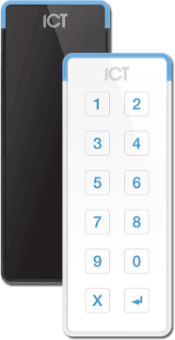 Access Control
Access Control
Voice & Data Wiring
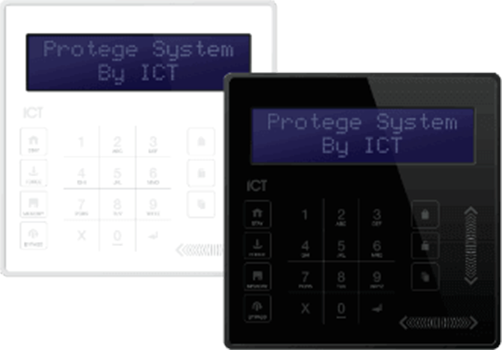 Burglar Alarm
Burglar Alarm
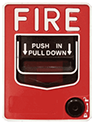 Fire Alarm
Fire Alarm
Video MGMT System
Voice & Data Wiring
THOUGHT CENTER > Blog > Security Systems
April 7, 2023
Business security systems use advanced access control and monitoring tools to provide the highest possible level of security to institutions and commercial properties. Security systems for businesses are hardwired for safe and reliable data transmission, and they employ the most durable hardware and the most advanced software to detect or deter crime and keep staff and guests safe.
Many business security systems include smart features that let businesses automate data collection, monitor employee behaviors, efficiently manage lighting and HVAC systems, and even receive automated reports with data-based insights to improve both workflows and the customer experience.
The five types of security systems for businesses provide video surveillance, access control, intrusion detection, fire and gas leak detection, and remote monitoring for affordable, round-the-clock security.
IP (Internet Protocol) security camera installations are the first line of defense for business security. They provide high-resolution video quality to recognize security incidents in real-time and collect actionable footage.
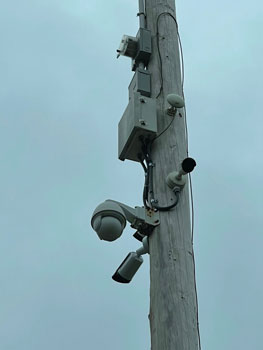
IP cameras are quickly replacing legacy analog cameras that often produce footage too blurry for detailed investigations and suspect identification.
Another advanced feature unique to IP video surveillance cameras is remote monitoring.
Owners of small businesses benefit from the ability to view livestreams and recorded footage on smartphone apps and personal browsers—at all hours and from anywhere with an Internet connection. Larger facilities and institutions benefit from remote access to video footage because security guard personnel and other staff are empowered to view livestreams on a mobile device, even when away from video surveillance control rooms.
Before allowing passage to secure areas, electronic access controls require a match between presented credentials and assigned site authorizations.
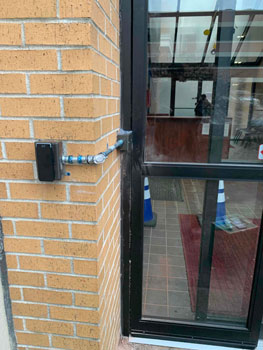
The process of secure door entry begins when door readers assess physical credentials like ID badges and key fobs, knowledge credentials like PIN codes, and biometric credentials like fingerprints. Once the door reader has authenticated the credential, the credential's identifying data is transmitted to the access control system's control panel.
The control panel is the brain of the access control system. It contains data on IDs and the specific authorizations at each entry point. When control panels find a match between preassigned access authorizations and the site where a credential is presented, they will transmit an electronic signal that will cause the door to temporarily unlock for passage.
The entire access control process, from authentication to unlock, occurs rapidly to enable the fast movement of authorized personnel.
MIFARE DESFire-encrypted proximity cards are an ideal business security solution. Not only are these cards nearly impossible to clone, but they also initiate no-contact authentication so that doors automatically unlock to allow seamless passage as authorized users approach.
Business burglar alarm systems are especially important after business hours and in areas that should be free of unauthorized activity, such as data storage rooms and safes.
Professional installation of alarm sensors reduces false alarms while providing alarm notifications to appropriate staff, monitoring companies, or law enforcement when forced entry and other security breaches occur.
Business burglar alarm systems that are connected with deterrence tools, such as strobe lights and sirens, provide turbocharged protection by sending most intruders running.
Those intruders who aren't deterred are often caught in the act by law enforcement because they wrongly assume that a commercial alarm system won't result in a response from local authorities. Intrusion alarms that have been integrated with surveillance cameras enable eyewitness confirmations of break-ins and other crimes that result in speedy police dispatches.
Fire alarms and carbon monoxide detectors are key components of business security systems. Specialized sensors detect symptoms of fire and gas leaks early to enable safe evacuations and timely responses from emergency services personnel.
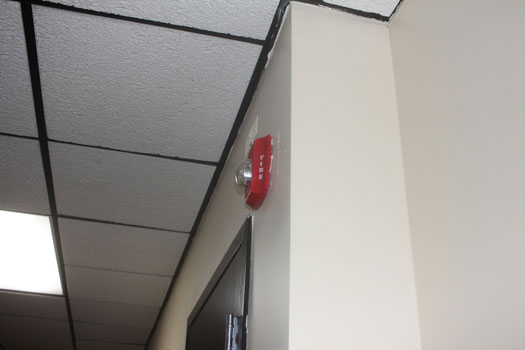
Regularly tested fire and carbon monoxide alarms are required in commercial installations because they are life-safety devices. Professional alarm installers like Mammoth Security test fire alarms and other safety equipment to help businesses comply with regulations and to ensure that life-safety devices function as intended during emergencies.
Remote security providers are the fifth form of commercial security for businesses. Remote monitoring involves the connection of IP cameras, sensors, and other devices with an off-site monitoring station. Alert security professionals, aided by artificial intelligence, keep an eye out for security breaches and respond to incidents quickly and appropriately.
A commercial-grade security system is a powerful tool for enhanced protection of assets, employees, and guests. To select the best security systems for your business, consider factors like the ability of the system components to integrate with components by other manufacturers, the availability of AI-supported security features, and compatibility with advanced video management systems.
Integrated security systems combine cameras, sensors, access control devices, and software platforms together for the convenient management of all systems on a single interface. Integration also enables data sharing between devices to reduce false alarms and improve situational awareness.
Whether you need to integrate your current security system components or would like the option of integrating your security in the future, our team at Mammoth Security recommends using ONVIF-compliant cameras and open-source software for easy integrations with products from different manufacturers.
In addition to improved security monitoring, sensors and cameras can be integrated with building management systems to support better energy management and environmental monitoring.
For example, sensors that monitor temperature, humidity, and air quality can be integrated with HVAC systems for optimized, eco-friendly energy usage.
Many of today's best commercial security systems offer advanced features supported by artificial intelligence.
For example, AI-supported video analytics are used to proactively detect suspicious behaviors that human guards might miss.
Other AI-based functionalities include heat mapping, person counting, facial recognition, and license plate recognition. These features enhance security and provide businesses with valuable insights into customer behaviors, business workflows, and overall operational efficiency.
A video management system (VMS) is a software platform for managing and controlling surveillance systems and video recordings. These systems provide users with easy-to-use interfaces where they can monitor footage, control cameras, organize, archive footage, and retrieve the footage.
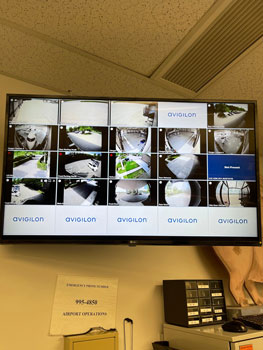
Video management systems like Avigilon feature artificial intelligence, making investigations efficient and easy. They provide smart filters so that investigators can rapidly sort through hours of video for footage for the specific individuals, behaviors, and other factors they need.
Video management systems can even be configured to trigger alarms or alerts based on predefined rules, such as motion detection, camera tampering, and recognition of watch-listed faces.
Some security system manufacturers provide better customer support than others, but manufacturer support is less important when your security system is installed by knowledgeable and experienced security experts—like those on our team here at Mammoth Security—who can be called over to service your system whenever you need them.
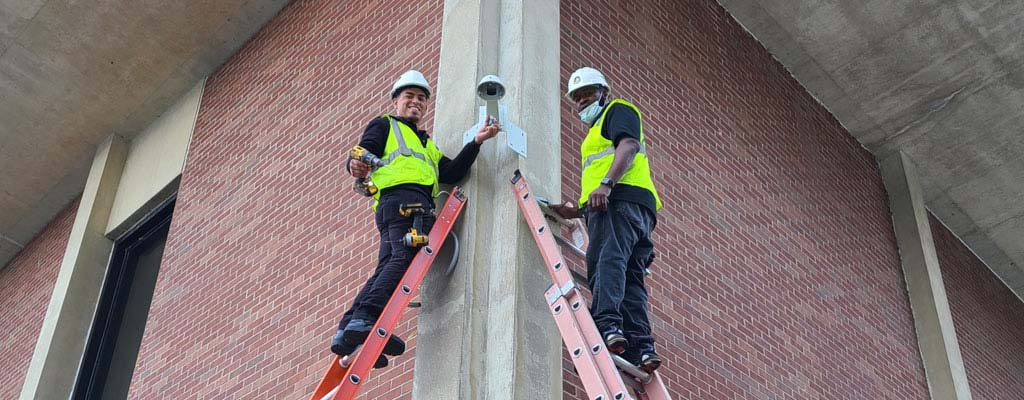
Businesses should ensure that their security system installation is customized to their specific needs and configured by experienced security professionals—like the friendly Mammoth Security technicians in this picture.
Whether you need to secure a massive indoor/outdoor site or a small business storefront, our crew knows how to assess your property and develop a security system that matches your security and business needs.
If you're ready for the next step toward protecting your property, please share your name and email address in the simple form below. We'll get right back to you to schedule a free site consultation with one of our friendly experts.
NOT COMPLETELY SURE?
860-748-4292The most important features to look for in a high-quality security system are open-source software and ONVIF-compliant IP cameras for easy system integrations, high-resolution video surveillance, and options for remote monitoring by your staff or a security provider. Also, be sure to select access control devices that use secure encryption technology.
Some business security systems do require contracts for features such as video storage and off-site 24/7 monitoring of alarms and cameras. Knowledgeable experts like those at Mammoth Security can help you to select the right system components for your security, whether those be no-contract arrangements or systems with specific contract details that align business security costs with your needs.
The regularity of security camera monitoring depends on the camera system and the business's security arrangement. AI constantly monitors security cameras with artificial intelligence and provides alerts whenever security breaches are detected. Other security camera systems can be monitored 24/7 by remote monitoring services. Monitoring cameras as often or as rarely as administrators see fit is possible. For example, many camera systems are only referenced when security incidents require investigation.
The pros of security cameras are improved situational awareness, crime deterrence, security monitoring, compliance monitoring, and evidence collection for investigations. The con of security cameras is the discomfort some people feel about being surveilled.
Footage from cameras is most often stored for anywhere from several hours to a few weeks—although it can be stored for shorter and longer periods. The footage isn't stored on cameras themselves: it's usually transmitted from cameras to the cloud (for Internet storage) or to local hardware devices, like network video recorders (NVRs) and digital video recorders (DVRs). The length of storage depends on the video quality and the memory size of the system's NVR, DVR, or cloud storage arrangement.